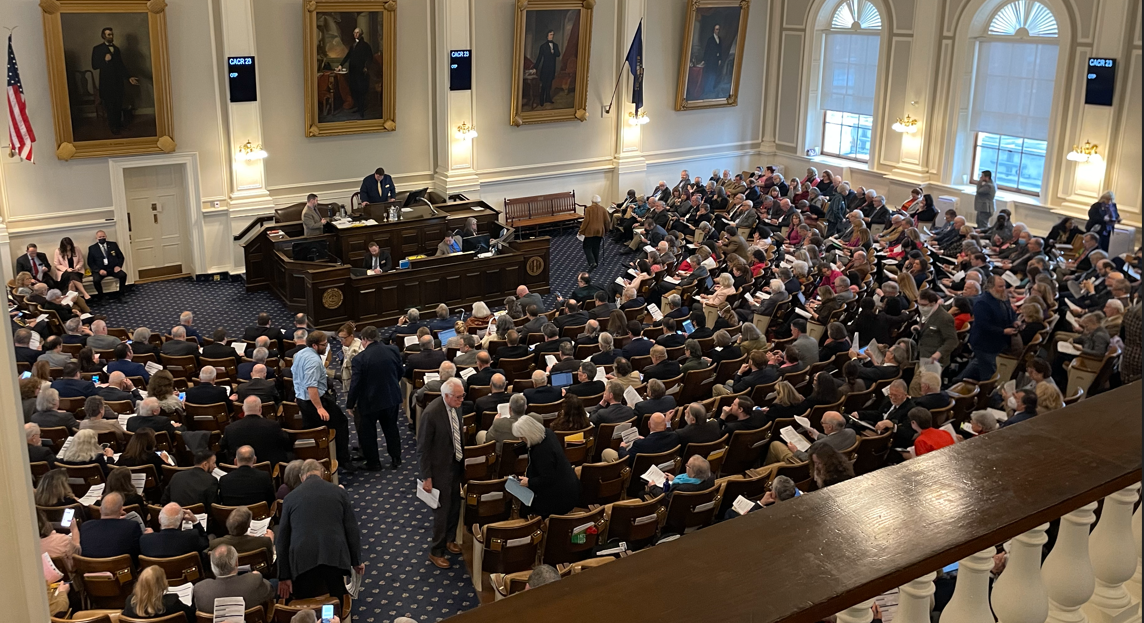By GARRY RAYNO, InDepthNH.org
CONCORD — People with right-to-know requests that are deemed “extraordinary” could be charged $25 an hour for the costs of providing the information under a bill the House passed Thursday.
Supporters of House Bill 1002 said the bill would move the cost of large requests that take public workers more than 10 hours from local or state taxpayers to those making the request, mostly large commercial organizations.
But opponents said the change in law is ripe for abuse and would interfere with attempts to hold government accountable while there are already safeguards in law to protect against frivolous, wanting or oppressive requests for public information.
The bill is supported by the NH Municipal Association and numerous city and town officials, but opposed by a broad range of organizations from the New Hampshire Press Association, to the Liberty Alliance, the American Civil Liberties Union, and Americans for Prosperity.
The vote in favor was 193 to 179.
Rep. William Dolan, D-Nashua, said a study by the Center for Public Integrity ranked New Hampshire 49th out of 50 states for access and accountability under right-to-know laws, and passing the bill may make New Hampshire 50th.
“This bill is not the answer. It limits freedom and will increase litigation,” Dolan said. “This is an over correction to address the problem of a few bad actors.”
But Nashua Alderman Rep. Michael O’Brien, D-Nashua, said his city makes it easy to access public meetings and information with televised meetings and its website.
“The information is out there,” he said. “What would you do if a citizen —who without the benefit of an election feels appointed by, I don’t know who, a dog catcher — are the people’s watchdog and demands access?”
He said that costs taxpayers money and the city has had to hire another attorney, and often the information requested needs to be redacted and that takes time.
“Nashua supports the right-to-know law,” O’Brien said, “but what it comes down to. . . is when is too much too much.”
The fee will make some of those with large requests think about what they want for information, he said, “rather than just spouting off.”
Rep. Louise Andrus, R-Salisbury, said the bill goes against the constitution and its call for government to be accountable to the people.
She said the Legislature in 1976 passed a right-to-know law guaranteeing access to public meetings and public records, saying the government needs to be open, accessible, accountable and responsive.
The law also said it is a citizen’s right to access government proceedings and records, and they should not be needlessly restricted, she noted.
The $25 an hour fee discriminates against those who cannot afford to pay the cost, blocking their access to government, Andrus said.
“We all serve the citizens of New Hampshire, and without the right-to-know law, there is no way to keep government accountable and transparent,” she said.
But Rep. Bob Lynn, R-Windham, argued the $25 fee is reasonable, and 37 other states have similar laws that charge fees for right-to-know requests.
He had no concerns about the bill’s constitutionality, he said.
The bill avoids shifting the cost of very large requests to the taxpayers of a city or town or the state, Lynn said, and provides at least some compensation to the agency that has to do the research.
One town testified they had boxes and boxes of material that was requested and not picked up, noting you do not have to say why you want the information or what you want to use it for.
“This requires the person to have at least some skin in the game,” Lynn said, “and in this circumstance I believe that it is appropriate.”
But Rep. Marjorie Smith, D-Durham, said the cost will prevent many citizens and organizations from seeking information and that will be a tool to obstruct information, or keep secrets or mismanage government business, she said.
The bill would allow cities and towns to decide if they would access the fees, and it allows waiving the fee for the indigent.
Decisions may be appealed to the state’s right-to-know ombudsman.
The bill now goes to the Senate for action.
Garry Rayno may be reached at garry.rayno@yahoo.com Garry is InDepthNH.org’s State House bureau chief with 40 years experience as a reporter.





